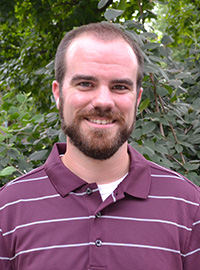 ME assistant professor uses applied physics and aerospace background to develop spectroscopy methods for thermo-fluids systems
ME assistant professor uses applied physics and aerospace background to develop spectroscopy methods for thermo-fluids systems
Engineering has always been James Michael’s calling. The new mechanical engineering assistant professor says he knew from the age of 12 that he wanted to be an engineer.
“Originally, I thought I wanted to be an astronaut, but most of them are engineers too,” Michael says. This interest led to a start in aerospace engineering, where he became interested in combustion and energy.
Michael attended the University of Maryland for his bachelor’s degree. He then went on to get both his M.S. and Ph.D. in mechanical and aerospace engineering from Princeton University, where he did work in plasma-assisted combustion and remote sensing.
“In graduate school, I picked up spectroscopy as a tool to study engineering systems, and that’s what I’ve been building my research interests around,” Michael says. “I work on developing spectroscopic tools to make measurements for thermo-fluid systems. Encoded in the light-matter interaction are thermodynamic quantities ranging from pressure to temperature to species concentrations in reacting and combusting systems.”
Michael says what really stands out about his work is how it can provide intuition into the operation of complex systems. “My research has applications from chemistry at small scales all the way up to industrial scale power generation.”
One of his current projects is with the Bioeconomy Institute, looking at fast pyrolysis, which he says is one potential route for the future of energy. He’s also working on multi phase flow problems where he analyzes materials in mixed states. “There’s a whole array of multi phase flow problems in energy and defense applications, where we have to study gas/liquid, gas/solid or solid/liquid mixtures.”
At ISU, Michael is developing a research program to study multi phase and reacting flows, as well as teaching thermofluids classes in the mechanical engineering department.